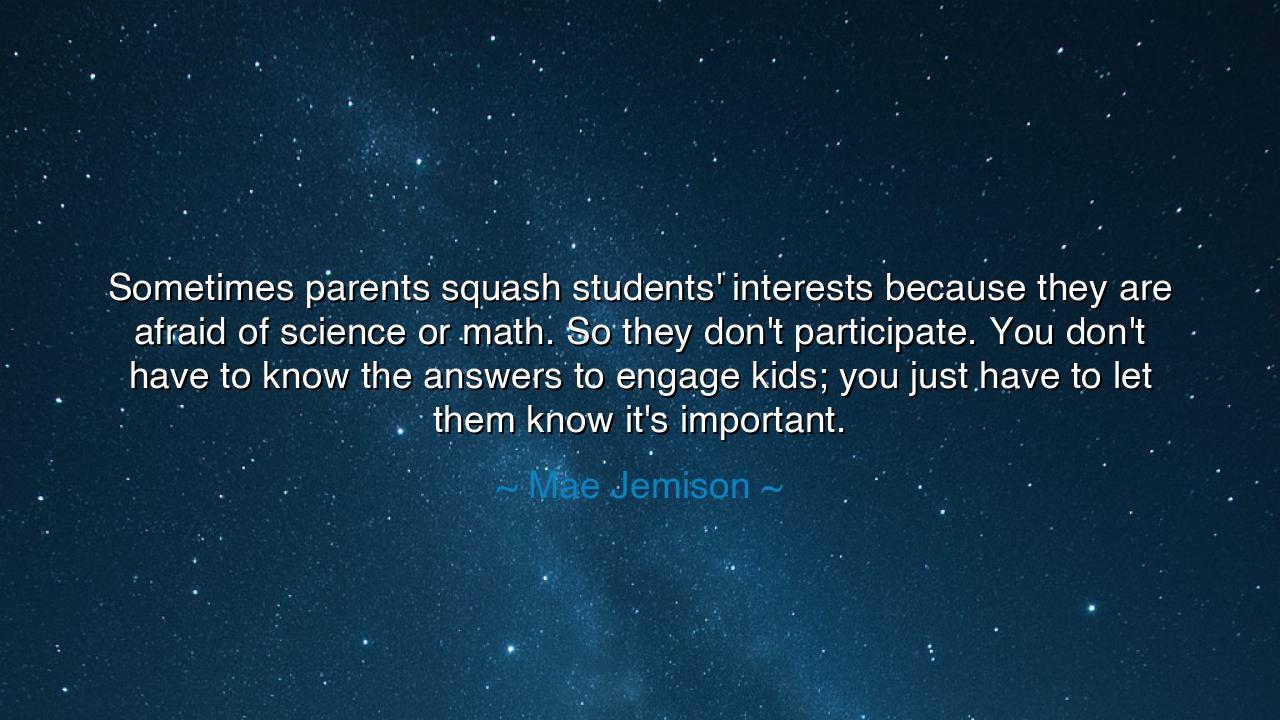
Sometimes parents squash students' interests because they are
Sometimes parents squash students' interests because they are afraid of science or math. So they don't participate. You don't have to know the answers to engage kids; you just have to let them know it's important.






In the grand journey of human progress, the quest for knowledge has always been at the heart of civilization’s advancement. Yet, as the great Mae Jemison reminds us, there are forces that can hinder the natural curiosity of young minds, especially when it comes to the disciplines of science and math. “Sometimes parents squash students' interests because they are afraid of science or math. So they don't participate. You don't have to know the answers to engage kids; you just have to let them know it's important.” These words carry a weight of truth, a call to those who are tasked with guiding the next generation. Parents, teachers, and mentors alike must recognize that curiosity is not to be stifled by the fear of not knowing the answer, but to be nurtured with a belief in the importance of exploration, inquiry, and growth.
The ancients, too, understood the power of engagement and the importance of nurturing curiosity in the minds of the young. The great Greek philosophers, such as Socrates and Plato, believed in the transformative power of questioning. Socrates, in particular, was known for his Socratic method—a way of engaging others in thoughtful questioning, not to provide answers, but to encourage deeper thinking. He did not have all the answers, but he believed that the process of seeking was just as important as the discovery itself. The ancients understood that the search for truth was a journey of the mind, and it was critical that young minds were not discouraged but instead challenged to think for themselves, to engage in the world of ideas with passion and purpose.
Just as Socrates believed in the power of asking questions to uncover deeper truths, so too does Jemison call for a shift in mindset. Parents and mentors need not have all the answers to foster curiosity. The ancient Egyptians knew this well, as they built the towering pyramids and studied the heavens. Their children were taught to observe, to question, and to explore the mysteries of the world. The priests of Egypt did not discourage a young mind from exploring complex topics but rather encouraged it, knowing that the pursuit of knowledge was a lifelong journey. When parents or mentors allow children to explore without the burden of expectation, they open the doors to creativity, innovation, and discovery—an act that echoes the practices of the ancient scholars and philosophers.
In the modern age, the importance of engagement in science and math is more critical than ever. The great scientists of history, such as Isaac Newton, Marie Curie, and Albert Einstein, were driven by curiosity. They did not see science as a set of rigid, unyielding answers, but as a path toward understanding the universe—a journey of questioning, discovery, and wonder. Newton, for instance, famously said that he “stood on the shoulders of giants,” acknowledging that his work was built upon the curiosity and inquiries of those who came before him. The very questions he asked led to groundbreaking discoveries in physics, and his curiosity became the foundation of modern science. Like Jemison, Newton’s path to discovery was not clear-cut but was marked by moments of wonder, engagement, and a willingness to ask bold questions.
The lesson in Jemison’s words is that to engage children in science or math, we must not be afraid to share our uncertainty and engage with them in the process of discovery. We do not need to be experts; we need only to show them that the search for knowledge is important, that curiosity is a powerful tool, and that learning is a journey that requires both patience and perseverance. As Ralph Waldo Emerson wisely said, “The first wealth is health,” but the first wealth of the mind is curiosity—an insatiable desire to understand the world and our place within it. The greatest gift we can give the next generation is not just knowledge but the freedom to explore, to ask questions, and to seek answers for themselves.
Throughout history, when curiosity has been encouraged, great things have come to pass. In ancient India, the study of mathematics and astronomy flourished. The work of Aryabhata and Brahmagupta laid the foundations for modern mathematics, with concepts like the zero and the decimal system that changed the course of human history. These brilliant minds were not discouraged by the unknown, but instead, they embraced it, seeing the mysteries of the universe as a call to deepen their understanding. The same spirit must live on today, in the classrooms, homes, and communities of the modern world. When we encourage children to explore science, math, and the world of ideas, we are giving them the tools to build a future of innovation, discovery, and progress.
So, let us take Jemison’s advice to heart. Let us not be afraid to engage with children in the pursuit of knowledge, even when we do not have all the answers. Let us show them the power of curiosity, the joy of discovery, and the importance of asking the bold questions that lead to greatness. For it is in nurturing their minds and encouraging their engagement with the world that we lay the foundation for the scientists, innovators, and philosophers of tomorrow—those who will one day stand on the shoulders of giants and push the boundaries of human knowledge even further. Curiosity, after all, is the spark that ignites the flame of progress.






AAdministratorAdministrator
Welcome, honored guests. Please leave a comment, we will respond soon